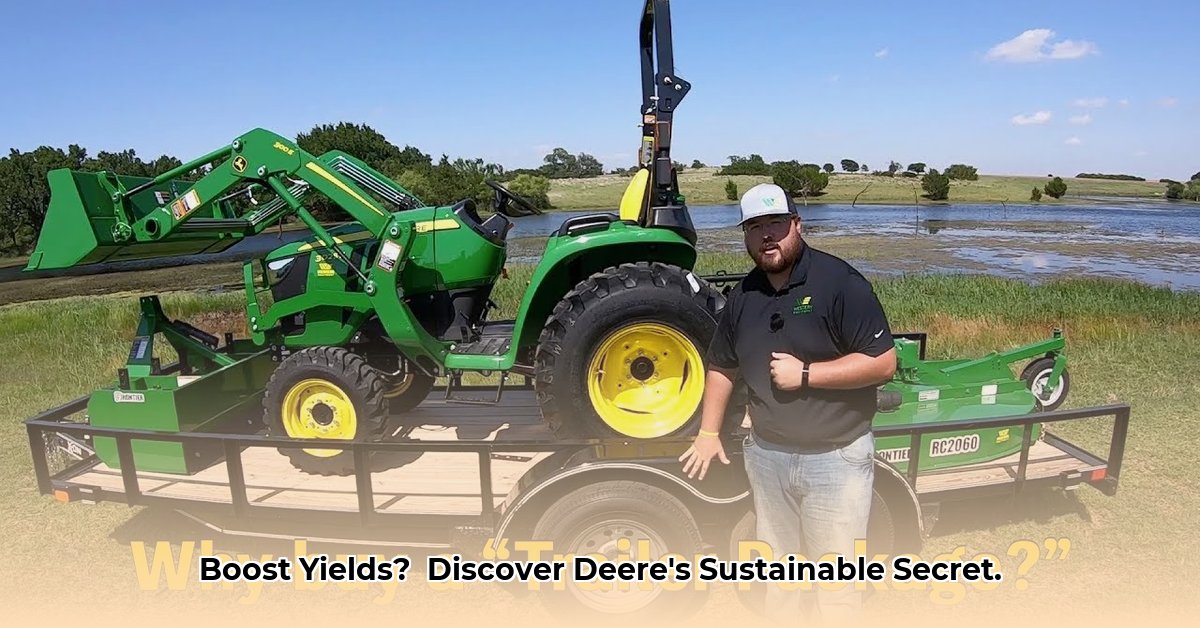
Sustainable agriculture is no longer a niche concept; it's a necessity for feeding a growing global population while preserving our planet. Farmers are increasingly adopting innovative methods to boost yields while minimizing their environmental footprint. John Deere tractor trailers play a crucial role in this transformation, enabling the efficient and sustainable transport of advanced agricultural equipment and harvested crops. Learn more about John Deere's advanced tractors by visiting this link. This article explores how these trailers, combined with precision farming and regenerative agriculture, contribute to a more sustainable and productive future for agriculture.
Precision Farming: Optimizing Resource Use for Maximum Yields
Imagine a farm where every plant receives precisely the resources it needs—no more, no less. This is the promise of precision farming, a data-driven approach that leverages technology to optimize resource allocation. GPS-guided tractors, sensors, and sophisticated software analyze soil conditions, crop health, and weather patterns to guide the precise application of water, fertilizers, and pesticides. John Deere tractor trailers are essential in this context, transporting the specialized equipment—automated sprayers, soil sensors, and data collection systems—that make precision farming possible. Efficient transport minimizes downtime, maximizing the utilization of this high-tech machinery.
But the transition to precision farming isn't without its challenges. High initial investment costs can be a significant barrier for many farmers. Furthermore, the effective use of this technology requires specialized training and ongoing data management expertise. Addressing these challenges requires collaborative efforts—government incentives (subsidies or tax breaks), accessible financing options, and comprehensive training programs, all of which could help increase the adoption rate of precision farming technologies. How can we overcome these barriers to make precision farming accessible to all farmers? One solution may lie in the development of more affordable and user-friendly technologies.
Regenerative Agriculture: Building Soil Health for Long-Term Sustainability
Regenerative agriculture focuses on enhancing soil health as the foundation for increased productivity and environmental resilience. This approach emphasizes practices like no-till farming (planting without plowing), cover cropping (planting non-cash crops to improve soil condition), and crop rotation. Healthy soil retains more water and nutrients, reducing the need for chemical inputs and boosting natural resilience. John Deere tractor trailers contribute by transporting the specialized equipment for these methods—no-till seeders, cover crop management machinery—ensuring efficient and timely implementation. Efficient transport also helps reduce spoilage and waste by ensuring harvested crops reach processing facilities quickly.
However, the transition to regenerative agriculture can initially present yield challenges. Farmers may observe lower yields in the early years as the soil recovers and builds its health. The need for robust farmer support networks and ongoing education is crucial to help farmers successfully transition to regenerative practices. How can we encourage greater adoption of regenerative farming practices? One potential approach is developing robust extension programs that provide personalized training and support to farmers in different regions and climates.
Climate Change Adaptation: Building Resilience in an Uncertain World
Climate change presents significant challenges to global food security. Extreme weather events—droughts, floods, heat waves—are becoming increasingly common, demanding greater resilience from farmers and their equipment. John Deere tractor trailers, built for durability and reliability, help ensure that farmers can transport crops despite challenging weather conditions. Their fuel-efficient design also minimizes emissions, contributing to a smaller carbon footprint.
However, adaptation to climate change requires more than just durable equipment. It also requires developing crop varieties that are more resilient to extreme conditions, and implementing climate-smart agricultural practices. How can we adapt our farming practices to climate change effects? Collaboration is key: Government policies that support climate-smart agriculture, research into drought-resistant crops, and the development of climate-resilient infrastructure are all vital steps.
The Future of Sustainable Farming: A Collaborative Endeavor
Precision farming, regenerative agriculture, and climate-resilient practices are reshaping the agricultural landscape. John Deere tractor trailers play a vital role in supporting this transformation by facilitating efficient and sustainable transport. However, achieving a truly sustainable future for agriculture demands a collaborative effort. Equipment manufacturers, farmers, governments, policymakers, and environmental organizations must work together to invest in farmer training, technological innovation, and sustainable infrastructure. This collective action is essential for creating a food system that is secure, sustainable, and resilient for generations to come. John Deere tractor trailers aren't just moving equipment; they are contributing to a more resilient and sustainable agricultural future.
How to Choose Climate-Resilient Agricultural Equipment:
- Assess Your Needs: Identify your farm's specific challenges and requirements.
- Research Equipment Features: Prioritize fuel efficiency, reduced tillage capabilities, and precision application systems.
- Seek Expert Advice: Consult with agricultural specialists and equipment dealers.
- Consider Long-Term Costs: Evaluate fuel consumption, maintenance, and potential yield increases.
- Evaluate Data Management Capabilities: Choose systems that facilitate effective data collection and analysis.